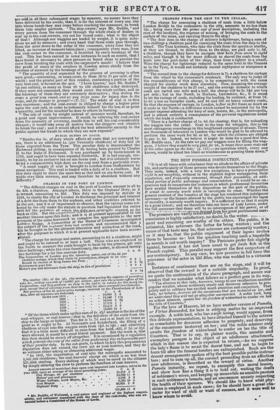CHARGES FROM THE SHIP TO THE CELLAR. " The charge
for conveying a chaldron of coals from a little belok, London Bridge to the consumers in the city, amounts to no less than 12:.; being more than the prime cost of most descriptions, including the rent of the landlord, the expense of mining, of bringing the coals to the
surface of the mine, and carrying them to the ship!
"The first item in the charge of delivery is lighterage, being a sum of two shillings a chaldron paid for conveying the coals from the ship to the wharf. The Tyne keelmen, who take the coals from the spouts or staiths, at they are termed, to deliver them to the ships, are paid only Is. 6d. a chaldron, though they have to navigate their keels from seven to eight miles, and though it be far more difficult to shovel the coals from the keels into the port-holes of the ships, than from a lighter to a wharf. Were the charge for lighterage reduced to the same level in the Thames as in the Tyne, it would not certainly exceed eightpence or ninepence a chaldron.
"The second item in the charge for delivery is 7s. a chaldron for cartage from the wharf to the consumer's residence. The only way to judge of the reasonableness of this charge, is by comparing it with the sums charged for similar work done elsewhere. Now, assuming the average weight of the chaldron to be 27 cwt., and the average distance to which coals are carted one mile and a half, the charge will be 3s. 5id. per ton per mile; but in the North, in Durham, Lancashire, &c., it is usual to let the cartage of coals, including the loading, by contract, at from 7d. to 8d. a ton on turnpike roads, and 9d. and 10d. on heavy country roads. So that the expense of cartage, in London, is four or five times as much as it costs in the North—a difference which cannot be accounted for by the greater expense attending the keep of men, horses, &c., in the metropolis, and is almost entirely a consequence of the perverse regulations under which the trade is conducted.
"There is a farther charge of Is. 6d. for shooting, that is, for unloading the waggon into the cellar. Next to the item for whippers, this is the most outrageous overcharge in this lengthened catalogue of abuses. There are thousands of labourers in London who would be glad to be allowed to perform the same work for 3d. or 4d., for which the citizens are obliged to pay Is. Oil. Indeed, we believe it might be done for a good deal less. Mr. Buddle says, At the rate we pay our waggon-men for filling the wag- gons, I believe they would be very glad, for 2d., to heave these same coals out of the cellar again up the hole,' (p. 121) ;—an operation which, every one knows, would be about ten times as troublesome as pouring them down."


























 Previous page
Previous page